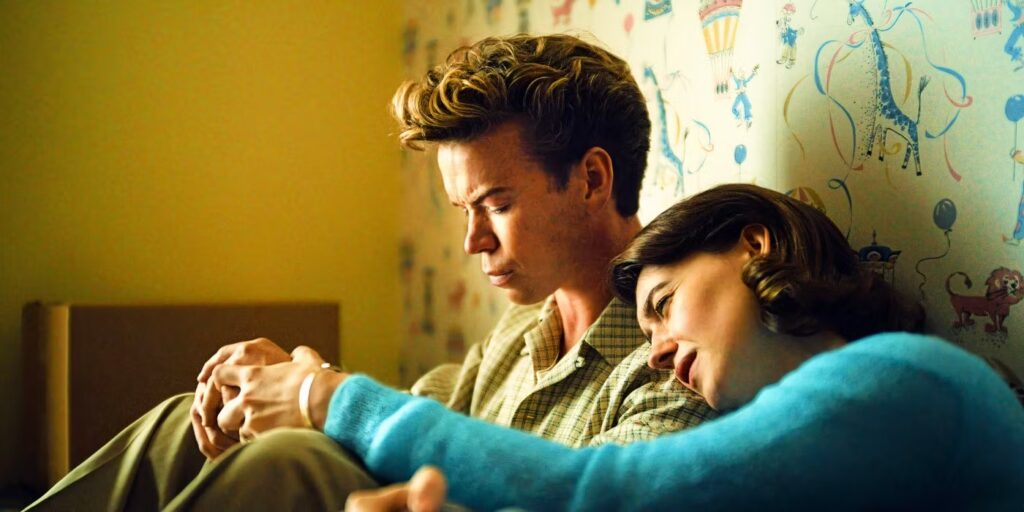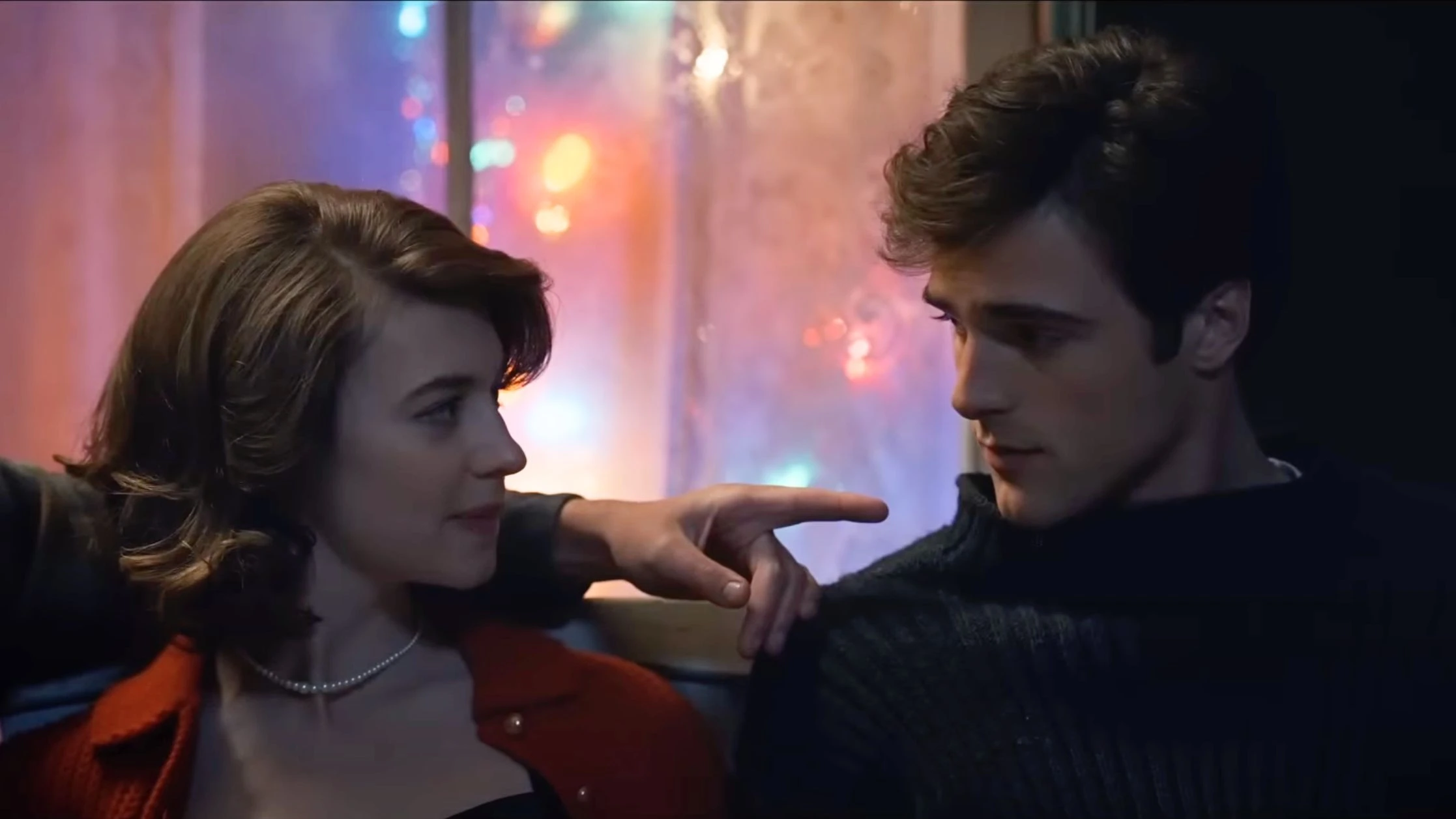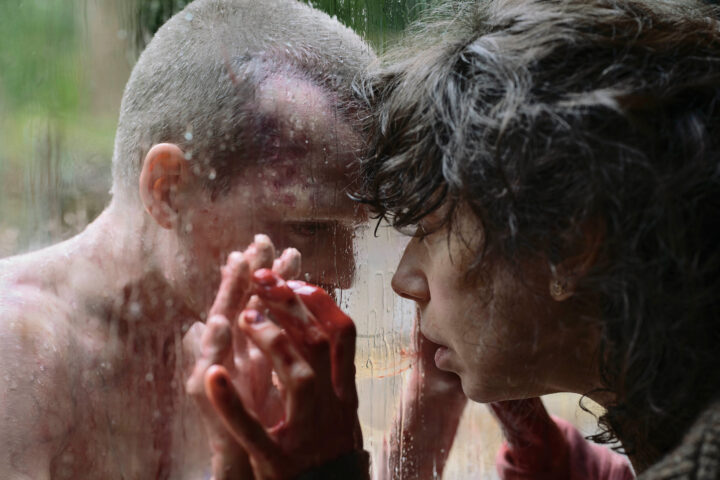On Swift Horses, a period melodrama about hidden love and sexual identity in 1950s America, is so tasteful it makes you wish it would cut loose with the abandon its characters experience in their frequently heated moments of self-discovery. Featuring an attractive cast led by Daisy Edgar-Jones and Jacob Elordi, director Daniel Minahan’s adaptation of Shannon Pufahl’s 2019 novel sometimes lacks dramatic urgency but compensates with characters we care for, played by eminently watchable stars. And that’s nearly enough.
The picture opens on Christmas Eve, 1956, where we meet live-in lovers Muriel (Edgar-Jones) and Lee (Will Poulter), nestled in a cozy Kansas farmhouse and, at Lee’s insistence, veering toward engagement. But the arrival of Lee’s rakish soldier brother Julius (Elordi) sets Muriel, already reticent about settling down, off-axis. One look at him reclining, shirtless sparks an instant connection, her husband-to-be’s brother is a source of magnetism and perplexity.
The brothers, who have both done stints in the Korean War, have a notion to move west and purchase San Diego property, and to Lee’s chagrin Julius has dropped out military service and is now broke, thwarting such dreams. The trio nonetheless hatch a plan to set up a California home together, providing the family comforts that the brothers, abandoned during childhood, missed.
Six months later, card shark and hustler Julius opts for Las Vegas, while Muriel struggles to commit to domestic life in a San Diego tract house development. She’s taken a job as a waitress in the local greasy spoon and Lee in a factory, but money is tight, Julius nowhere to be found and she’s adrift, sending endless letters to her wayward brother-in-law in the hopes of his return. “He’s not like us; his passions are different…he gets to live like there’s no tomorrow,” Lee cautions. But this doesn’t stop his wife from sending secret money to Julius for a bus ticket that isn’t to be.
Secrets lives are on order here, Muriel eavesdropping on customer conversations for tips at local racetrack, where she privately nets thousands in cash (to fund Lee’s dream) and actualizes an independent streak leading to a surprising, intense attraction to olive and egg farming neighbor Sandra (a terrific Sasha Calle). It isn’t long before she finds herself in a clandestine, gay hotel bar downtown. “It’s like I saw something no one ever told me was there before,” Muriel muses, but her rabbit hole exploration will come at a price.
Julius, meanwhile, is living with his own secrets, and after securing a casino security job he develops a passionate under-the-radar relationship with Mexican immigrant and colleague Henry (Babylon’s Diego Calva), meeting on the downlow for sensual trysts while both dream about a future. For Henry, that means teaming up for blackjack scams (“People like me…if we want something we have to take it”), but swooning Julian dreams of a more meaningful union, confessing, “I’ve been a thief, a faggot and alone, and for the first time in my life I can finally see around the next goddamned corner. Because I’m with you.”

There’s self discovery and heartbreak in On Swift Horses, and the attractive cast works hard to sell the melodrama even if the film seems overly tidy, only sporadically engaging and at times, languorous; it feels every bit of its 118 minutes. “We’re all just a hair’s breadth from losing everything, all the time,” one character says amidst the threat of discovery, and Minahan and screenwriter Bryce Kass might have done well to inject more of such high stakes tension. Consequently, the film is pleasant to watch but a not-quite-potent essay on being gay during the 1950s, a time when going public with one’s sexual orientation would mean certain stigmatization, imprisonment, professional ruin or even the fear of being branded a communist.
The movie isn’t so concerned with these perils. Instead, it gazes at a handful of interesting lives intersecting at romantic, emotional and sexual crossroads. Each of the relationships in the movie is well-written and acted. The 1950s nuclear family marriage between Lee and Muriel is given great sensitivity, and the behind-closed-doors euphoria of finally being seen by a lover, as Lee experiences with Henry, is fraught with fear but intensely liberating as the formerly directionless lost Julius finds purpose through love.
The film is smart about the covert lives sometimes led by gays in marriages and with families and the private distance required in the struggle to serve convention and self. While Muriel sees “endless possibilities” by spending liberated days off in that secret hotel bar, she closes her eyes during sex with Lee, compartmentalizing and transporting to a surer, unspoken sense of self. Mysteriously and despite her burgeoning truth, a near-romantic fascination with Julian remains, and a terrifically acted reunion scene becomes a confession rendering cross intentions.
This is all reasonably absorbing, but one need not look far for better, similar films on the period gay experience, from the elegant ache of Todd Haynes’ Carol to the longing of Luca Guadagnino’s recent Queer to the force of nature in Ang Lee’s Brokeback Mountain. On Swift Horses doesn’t have the gravitas or sweep of those films.
But it does have a fine cast and terrific production values, notably period perfect art direction by Kate Weddle and Elizabeth Newton, lush widescreen cinematography by Luc Montpellier (Women Talking) and a romantically crooned original ballad by Loran Kramar. Minahan does well with his actors, the exquisite Edgar-Jones calling to mind a sunny young Anne Hathway on the surface while roiling beneath; she has a terrific moment alone in the mirror where she experiments with her appearance, and convinces as a woman taking a risk by coming into her own, trying to minimize wreckage.
Elordi, the vision of preternatural beauty that Emerald Fennell used so well in her sensationalized Saltburn, here presents both intense virility and understated vulnerability, all but lighting the movie on fire. Poulter, who has developed into a fine actor (and can currently be seen in an about-face performance in Warfare), gets under the skin of a man who loves his wife and brother deeply, yet is forced to forge his own road. And dual paramours Calva and Calle are agreeably believable, sensual catalysts.
On Swift Horses can sometimes feel slightly low key, while at others ripe melodrama barely skirts soap opera, particularly in a coincidental chance meeting near the picture’s end. Yet Minihan concludes the movie on a shot of such tender hope—if you are willing to buy the “love means everything and conquers all” adage—that we realize just how much we have come to like these characters and how willing we are to go along. The film’s most emotional passage is saved for its final minutes, a simple pan across a push-pin message board of communications to lost or missing gay friends, lovers and family members living their truth with an authenticity could cost freedom or their lives. Elordi’s single shot reaction delivers it.
3 stars



